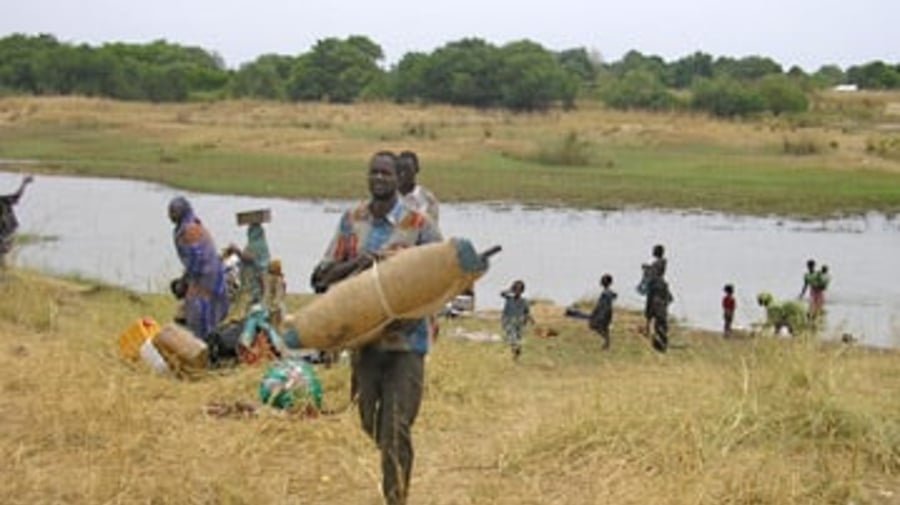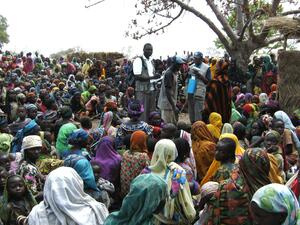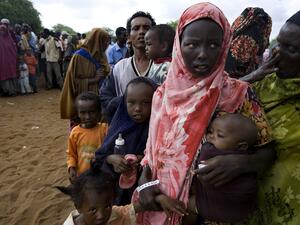Spreading conflict in Central African Republic forces civilians into Chad
Spreading conflict in Central African Republic forces civilians into Chad

Civilians crossed the Barh Aouk River with a handful of possessions and the clothes on their backs.
DAHA, Chad, March 27 (UNHCR) - Tens of thousands of civilians from the Central African Republic have fled to southern Chad to escape banditry and fighting between the government and rebels in recent years. Ache Abakar never imagined she would one day be among them.
But last Saturday, the exhausted 50-year-old crossed the Barh Aouk River with her five grandchildren and sought shelter in the Chadian village of Daha. They had spent three days on the road, hiding in the bush at night and feeding on mangoes, after the fighting finally reached their village in the Ndélé region of north-east Central African Republic.
"Everybody in our village fled to Chad. Some are still on their way. There should be no one left in Kounde [village]," Ache told UNHCR shortly after arriving here. "This is the first time I've been a refugee in my life. I never expected that."
She was among a group of more than 130 civilians who arrived in Chad on the same morning, most of them carrying a handful of possessions and the clothes on their backs. A few people forded the river on bicycles.
They gathered under trees by the riverbank, waiting for members of a UNHCR team to guide them to the registration centre. Since the latest wave of violence erupted mid-January across the border, UNHCR staff in Daha have registered more than 8,000 refugees from the Central African Republic. A further 2,500 have been registered at Massambaye, located 125 kilometres east of Daha.
The refugees in Daha, mostly women, children and the elderly, have received a warm and generous welcome from locals. They live in two sites near the village and are able to use the health and education facilities.
But the arrival of so many people in eastern Chad's Salamat region has caught the local authorities and humanitarian aid workers by surprise and shown how the conflict in CAR has spread. Some 56,000 CAR refugees are living in five refugees further to the west, but they are victims of a separate conflict.
The new arrivals will soon settle down to refugee life, but for now they are tired and hungry - especially the children. They soon open up to strangers, explaining how the simmering unrest in CAR has finally reached their part of the country.
"The rebels came to our village and asked us to hand them over all our food and belongings. We had no choice," Ache said, adding that the army later arrived and accused them of supporting the rebels. They decided to flee after hearing that a neighbouring village was attacked and 25 people killed.
The refugees all originate from 18 villages along the road from Ndélé to Ngarba in north-east CAR, where fighting flared between rebel tribes and the armed forces more than three months ago. Although the government has made peace overtures, the area remains volatile and people are still fleeing.
UNHCR has sent an emergency team and aid supplies to Daha, including plastic sheeting, mats, blankets and cooking utensils. The agency and Médecins Sans Frontières are helping the local health centre. The World Food Programme (WFP) has provided sustenance, while the UN Children's Fund (UNICEF) has inoculated all local and refugee children against polio and measles and launched nutrition and water and sanitation programmes.
Simply getting aid to the area is an immense logistical challenge as Daha is located almost 1,000 kilometres south of the UNHCR hub of Abeche in eastern Chad. Most aid comes by road, while some staff come by helicopter. During the May-October rainy season, Daha will be inaccessible by road and the aid flow will be reduced.
That does not seem to bother the refugees, who can find fish in the river. "Our cattle are still on the other side [of the river border] and we have already planted crops in our fields," said Hapitsa, a mother of four, who added that most of the menfolk had remained in CAR. She said she was ready to move to a refugee camp, so long as it was near the border and their homes on the other side.
But the new arrivals are not spending too much time thinking about relocation or repatriation. "All that counts is that we are alive. We made it here. And now at last, we can rest," said Ache.
By Annette Rehrl in Daha, Chad




